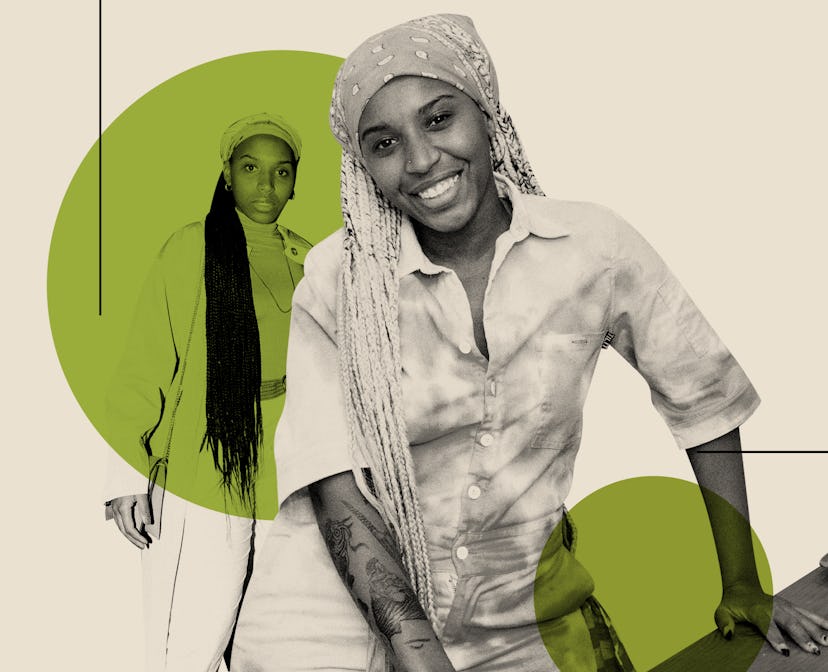Food
What Hospitality Means To Kia Damon
The chef and Instagram personality has been serving her community through protests and the pandemic.

Kia Damon has made sustenance her livelihood as a food truck line cook, executive chef, IGTV personality, and founder of the Kia Feeds the People Program, a nonprofit that works with farmers, distributors, and provisions makers to provide free produce boxes and pantry goods to Brooklynites who have trouble accessing affordable healthy meals. Behind the scenes, however, Damon is navigating her relationship with food and health amid the pandemic and ongoing Black Lives Matter protests.
Bustle spoke with Damon, 26, about how her understanding of hospitality is changing during this tumultuous season.
Food and I have a tricky relationship. In the professional sense, I love it. I can be imaginative with it. Manipulate it. Use it to bring smiles to people’s faces. In my personal life, I struggle with body image and IBS, so I’m constantly fighting a battle to find a healthy relationship with myself through what I eat. It’s hard as hell being a chef in that regard.
I started to resent food while in quarantine because everything was making my stomach hurt. #WhatsUpWithKiasGut, a candid showcase of my experience with IBS on Instagram, is about taking note of what I put in my body. I don’t say this with the restrictive mindset that often comes with wellness and eating fads, but as someone who likes to eat ice cream and knows that maybe I shouldn't. What hurts my stomach isn’t always what’s perceived as “junk food,” either — sometimes it’s pasta or a type of vegetable. Sometimes it’s stress, regardless of what’s on my plate. I’ve gotten in the groove of paying closer attention to digestion and feel liberated from being able to learn new ways of eating while listening to my body.
I can’t overturn an entire racist system that makes sure the only way to get groceries nearby is from the corner store, and I definitely can't do it overnight.
Taking stock of my health while in quarantine doesn’t mean that I suddenly have the capacity to cook all day, but I do try to use what’s available in the pantry instead of getting takeout. When preparing meals, I make it a point to ensure nothing goes to waste, like turning scraps and carcasses into vegetable and chicken stocks. This resourcefulness is a key component of what I’ve dubbed as the struggle meal, which is all about repurposing what you have in the fridge already — the epitome of the saying, “We’ve got food at the house.” You can make something with anything.
It’s with this mindset that I look at food through a political lens. I’m making sure my people are eating while putting themselves on the front lines. I’ve spent days with my friends biking meals directly to Black and QTPOC protesters. Now, I’m working on bringing back my Supper Club From Nowhere and starting the Kia Feeds the People Program in the hope of battling food apartheid in downtown Brooklyn and the surrounding area. I can’t overturn an entire racist system that makes sure the only way to get groceries nearby is from the corner store, and I definitely can't do it overnight. What I can do is make sure Black people are getting boxes of good-ass produce. As of now, I hope to do monthly deliveries, and maybe with enough funding and hands, we can do twice a month. I've also been reading up on the Black Panther Party’s free breakfast program, as well as staying up to date on the initiatives that some of my peers are doing. There's been a lot of meditating involved for my anxiety, but also on what it means to be in this line of work.
This is hospitality. We have to serve our people and serve our community, and even though it can be challenging work, I'm realizing that it doesn't have to kill me. A lot of this work has been done before and is being done now by radical farmers and fellow chefs. I feel blessed to follow in their footsteps and arm myself with the knowledge to carry the torch. There’s self-preservation in knowledge.
This interview has been edited and condensed for clarity.
This article was originally published on